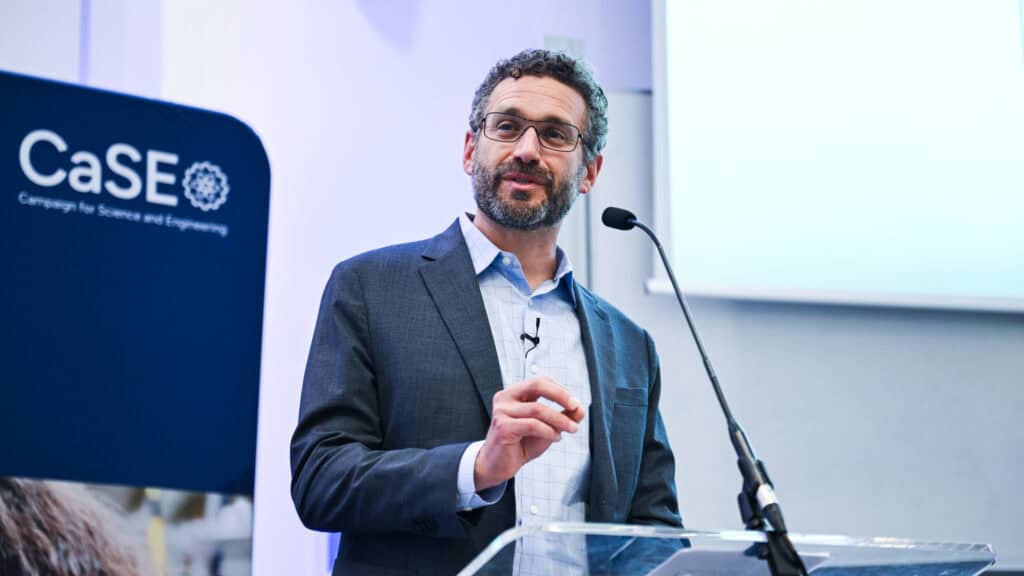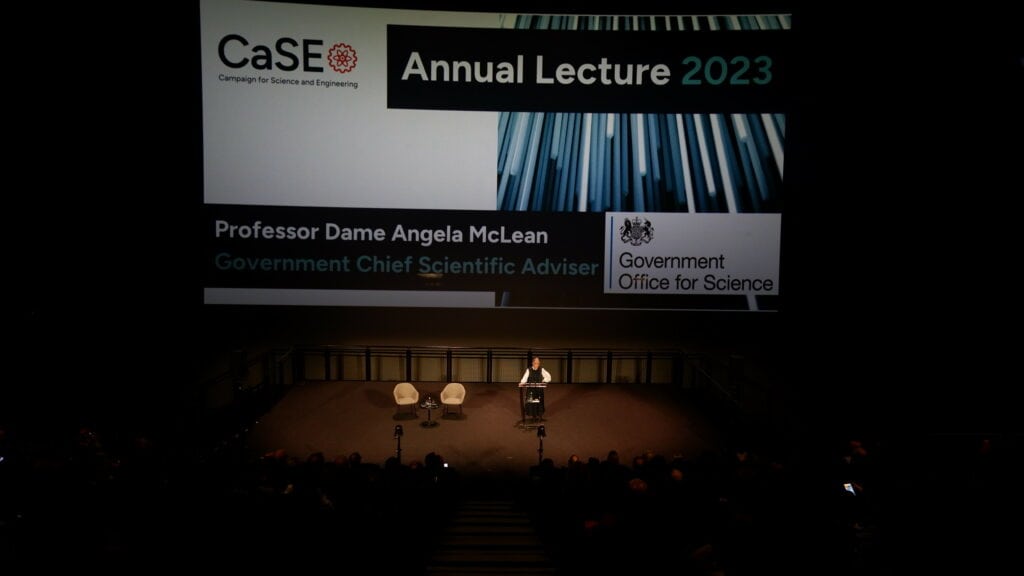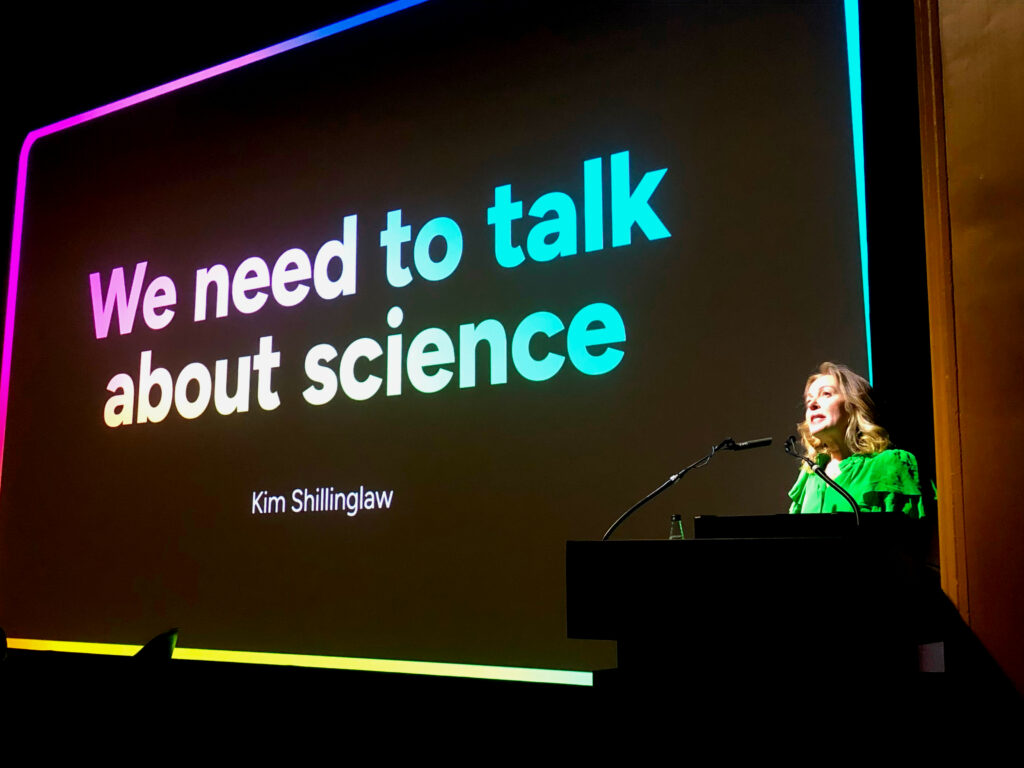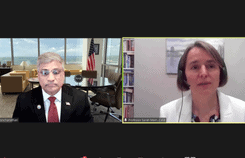CaSE’s Annual Lecture is our biggest event of the year and the result of months of planning. It was great to see nearly 200 members and collaborators in attendance to hear all about Artificial Intelligence from three distinguished speakers. The topic of AI has some history with CaSE, indeed our inaugural annual lecture was given by Professor Sir James Lighthill in 1987, whose work was referenced by one of this year’s speakers, Professor Dame Wendy Hall, in her work on the Government’s AI review.
CaSE Annual Lecture 2018: ‘Making Artificial Intelligence A Reality’
20 Dec 2018
The lecture was kindly hosted by the Institute of Physics (IoP) in their fantastic new building, and IoP CEO Paul Hardaker welcomed the speakers and attendees, with what looks like an exciting year ahead for the IoP in developing their new strategy.
The event was sponsored by Elsevier and we thank them from for all their support. CaSE Executive Director Dr Sarah Main said that the support that CaSE received from its members was crucial in ensuring CaSE can contribute to the debate on major national issues and encouraged continued engagement with members. Sarah said that the topic of the evening, AI, was another example of a national issue that will affect both Government and science. Not just when considering the technical points of AI research and development, but also the effect that this could have on society and people’s lives.
She then introduced the three speakers for the evening, Professor Jim Al-Khalili, Professor Dame Wendy Hall and Professor Alan Winfield.

Professor Al Khalili started off by saying that it seems the interest in AI has grown hugely over the last year. He reflected on the fact that the internet has only been around for just shy of 30 years and remarked on the difference this has made to our lives and the world. He said that AI can have a similar, if not larger transformative effect on us and this is why many see AI development as exciting, but many also are afraid of the changes. He asked Dame Wendy and Professor Winfield to give a general definition of AI to get started.
Dame Wendy started by saying that the concept of AI has been in existence since the 1950’s, when Alan Turing referred to it as ‘intelligence’ and his paper questioned whether machines could think. Many of these ideas were picked up in the United States where the phrase ‘Artificial Intelligence’ was coined, still considering the question of could a machine think as well as a human. Dame Wendy caveated this by saying this very much depends what you consider ‘think as well as a human’ to mean, and perhaps who the human in question is.
Thinking about timelines for development, her view is that AI development is different to the development of the internet as AI research experiences great leaps forward and then finds itself in an ‘AI winter’ where funding and support for AI becomes scarcer. She said that the UK lost lots of researchers, primarily to the US, during the first ‘AI winter’. This resonated with many issues our members are wrestling with after periods of flat-cash settlements for research and costs of research increasing, something we are committed to highlighting in the run up to next year’s Spending Review. Dame Wendy said that North America continued funding AI research which led to the development of neural networks, which in turn has enabled amazing technologies such as AlphaGo by Deep Mind and IBM Watson.

Dame Wendy then posited, if AI has been around for so long, why is the hype around AI so great now? And indeed why is it the subject of government reviews and annual lectures. She believed that the sophistication of machine learning has captured public attention with developments such as Siri, Alexa and face recognition technologies in the last few years. She said that these developments have been helped by the large amount of available data and super-fast computers have facilitated these technologies. She remarked on how world leaders met in Davos in 2017 and were each given a copy of The fourth industrial revolution by Schwab, leading to many returning worrying about AI and jobs of the future, which led to the commissioning of the AI review. Dame Wendy said that the current hype around AI has the potential to drive development but believes another ‘AI winter’ will occur. She finished by saying that it is very important to continue to support AI research going in periods beyond hype cycle.
Professor Winfield says there has been a shift between public and private sources of AI research. Enormous private investment, with near infinite budgets and the ability to attract the best people, private industries have been able to undertake great research. Prof Winfield believed that most of these areas of development were exploiting previously unexploited fruit of AI research, meaning there was lots of productive innovation without strictly being ‘new’ science.
Professor Al-Khalili asked the panellists if they can understand why people are concerned about AI developments. Professor Winfield said yes and no. He said that people shouldn’t be concerned about the intelligence that is emerging and said that some famous people and some scientists had spoken about concerns over ‘super intelligence’ of AI, but in reality there is a large gap between what some people are fearful of and where technology is today, if achievable at all. Professor Winfield did go on to say that the use of AI for political weaponization as seen in the Brexit referendum and US presidential elections is an example of misuse and is cause for concern. He also held concerns over the use of AI in applications such as predictive policing, recommending loans or assessing immigration status.

We then turned to the question of the wider ethics of AI, and whether we are we thinking the right things. Dame Wendy said that the conversation about ethics was absolutely needed, particularly around data ethics and who can do what with our data. He said we will need to develop ethical principles in a global way to continue with digital trading with no barriers, with a deep understanding of what should be regulated and what should be allowed to flourish. As Professor Al Khalili pointed out, the UK is a leader in AI and Professor Winfield said that the UK Government and Parliament deserved credit for being mindful and thoughtful of trying to find the balance between important regulation and when regulation is perhaps not required. He pointed out that alongside being a leader in AI, the UK has been seen as a beacon for thinking about the ethics of AI. Dame Wendy said that the UK is a great base for AI, boasting good universities, manufacturing and is one of the best for tech start-ups. She believes that there could be real advantage to the UK leading on regulation across AI.
Professor Al-Khalili asked what role Government should take in the public understanding of AI. Using it as an example, Professor Winfield said that the Government should promote a national conversation on things like driverless cars and how this could affect cities and urban spaces. Dame Wendy said that driverless cars will not be the only leap forward in transport, and new trains, drones or pods will mean that the current balance of transport systems will not necessarily be the same as they are today. As an AI novice, hearing the discussion about not just how new technologies could change our lives but how such technologies may interact with each other in the future was something I had never thought about before.
Professor Al-Khalili then spoke about the issue of automation on jobs and how hard it is to imagine the effects that AI will have on jobs in the future which will need a change in education and training of people. Professor Winfield wanted to put a positive spin on the question and think about how automation will allow us to work less. He said the real issue is how the benefits of automation could be shared equally amongst everyone. Dame Wendy said that we need to reassess the value that we place on roles that require human interaction, for instance in care work, and how the UK can benefit from automation.
The discussion was then opened to the floor, where the panellists took a series of questions from attendees.
The first questions focused on the balance of public and private support for AI research, and both Dame Wendy and Professor Winfield talked about the crucial role of public support for research in universities very much shaping what private companies develop. Dame Wendy added that universities are crucial in the development of skilled workers and new & innovative ideas that will shape future industry developments.
In particual the importance of funding for blue skies research, which has become more scarce, for pushing the boundaries and creating whole new areas of research which will be the fuel for industries and technologies in ten, twenty or thirty years.
Further questions on the possibilities for the creation of robots to make ‘moral’ decisions, help in healthcare and combat loneliness were then posed to the panel. As a Professor of robot ethics, Winfield said even if a robot could make decisions based on morality, it doesn’t make it a good thing and said that due to the real danger of cyber attacks, it would be easy to turn an ‘ethical robot’ into an unethical one simply by inverting one piece of code. So in his view we’d need to resolve the issue of cyber security first. Healthcare is an area where we hear a lot about the potential of AI. Dame Wendy said that this potential must be explored in multidisciplinary ways by economists, social scientists, health care professionals and patient groups and not just be left to ‘geeks’ in order to fully assess what is required and the possibilities of supporting healthcare.
There were more questions than we had time for, so the Chair of CaSE’s Board, Professor Graeme Reid, closed the first part of the evening by thanking the panel for prompting such a lively discussion by taking such a broad subject and peeling back certain challenges that not only face AI but the whole of the UK. Discussion then promptly continued over a few drinks. Events like this simply wouldn’t be possible on the CaSE budget so we would like to give our sincerest thanks to Elsevier for sponsoring the event and the IoP for hosting us.

Watch the full discussion below (starts at 15 mins)
You can also follow all the Twitter coverage from the event CaSE Annual Lecture 2018
Related resources

CaSE’s 2024 Annual Lecture was given by Ilan Gur, CEO of the Advanced Research and Invention Agency (ARIA) on December 12th.

The 2023 CaSE Annual Lecture was given by Prof Dame Angela McLean.

CaSE’s 2022 Annual Lecture, given by Kim Shillinglaw, explored how the UK can forge a deeper and broader public connection with research and innovation.

Read our write-up from the CaSE Annual Lecture 2021 given by the Director of the National Science Foundation, Dr Sethuraman Panchanathan.